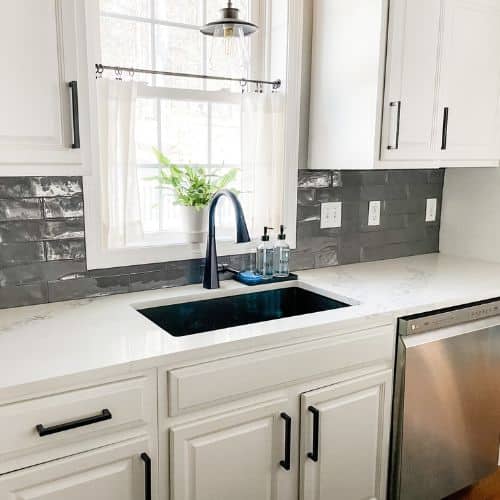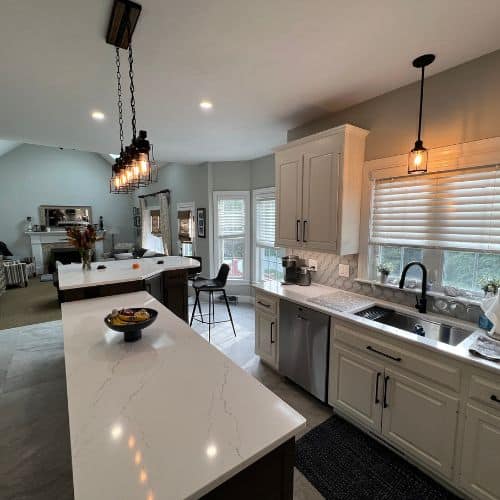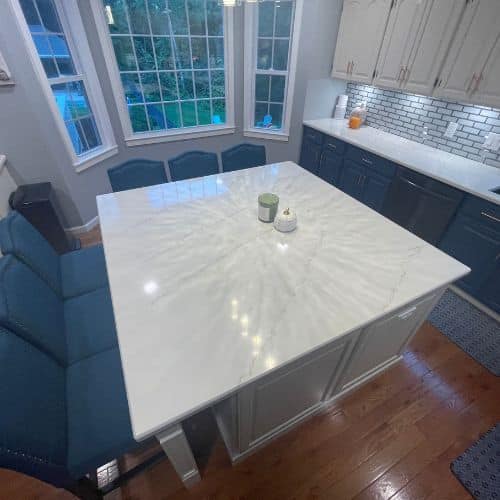Table of Contents
Quartz vs Porcelain Countertops – Why Porcelain is Becoming More Popular
The Beauty and Durability of Porcelain Countertops
In the debate of quartz vs porcelain countertops, porcelain is becoming more popular. Let’s find out why! This blog will give updated information on quartz vs porcelain as of August 2023.
Imagine stepping into your kitchen and being greeted by a stunning surface that seamlessly combines beauty, durability, and functionality. A surface that not only elevates the aesthetic appeal of your space but also withstands the demands of a busy kitchen. Welcome to the world of porcelain countertops—a trend revolutionizing kitchen design with its unmatched qualities and versatile style options.
In recent years, porcelain countertops have gained significant traction in the world of interior design, particularly in kitchens. As homeowners and designers seek materials that offer the perfect blend of practicality and aesthetics, porcelain emerges as a top choice. Its unique characteristics make it an ideal option for those who desire a surface that is both visually striking and highly durable.
In this blog post, we’ll go over porcelain countertops in more detail, exploring their advantages, design possibilities, and practical considerations. Get ready to discover the beauty and functionality of porcelain countertops—a material that has captured the hearts of homeowners and designers worldwide!

What is Porcelain?
Porcelain is a ceramic material crafted from a mixture of fine clay and other minerals. It undergoes a high-temperature firing process resulting in a dense and non-porous surface. This unique composition gives porcelain its exceptional qualities, making it an excellent choice for kitchen countertops.
Porcelain is renowned for its durability and strength. It is crafted to withstand the rigors of daily use, ensuring that your countertops remain beautiful and functional for years to come. Its dense composition also makes it resistant to stains and water absorption, making it an ideal choice for areas prone to spills and moisture.
Porcelain Countertops are Durable, Heat Resistant, and Scratch Resistant
When it comes to durability, porcelain countertops excel. They are highly resistant to chipping, cracking, and impact, making them suitable for even the busiest kitchens. This durability ensures that your countertops can handle the demands of daily cooking, meal preparations, and various kitchen activities without losing their beauty or structural integrity.
Porcelain is also exceptionally heat-resistant. It can withstand high temperatures without warping or discoloration, allowing you to place hot pots and pans directly on the countertop surface, without worry. This heat resistance adds to the functionality and convenience of porcelain countertops, making them a reliable choice for avid home cooks and culinary enthusiasts.
In terms of scratch resistance, porcelain countertops offer exceptional performance. Their dense composition and hard surface make them highly resistant to scratches from knives, utensils, and other kitchen tools. This characteristic ensures that your porcelain countertops cost maintain their sleek appearance even with regular use.
Quartz vs Porcelain Countertops and Other Materials
When comparing porcelain countertops to other materials commonly used for kitchen surfaces, porcelain stands out for its unique combination of characteristics. Unlike other natural stone countertops used, such as granite, marble or quartz countertops, porcelain is non-porous, which means it does not require sealing. This makes porcelain easier to maintain and less susceptible to staining or bacterial growth.
Compared to quartz countertops, porcelain offers similar durability and resistance to heat and scratches. However, porcelain provides additional design options, as it can mimic the look of natural stone surfaces, wood, or other materials while still offering the benefits of a ceramic surface.
Ultimately, the choice between different countertop materials comes down to personal preferences and specific needs. However, porcelain countertops present a compelling option with their durability, heat resistance, scratch resistance, and design versatility!
Porcelain Countertop Design Options and Aesthetics
Porcelain countertops offer an extensive array of design options to suit any kitchen style or aesthetic preference. From subtle neutrals to bold hues, the color options are vast and diverse. You can find porcelain countertops in classic shades like white, beige, and gray, as well as vibrant colors like blue, green, or even black. This variety allows you to select a color that complements your kitchen’s overall design and personal style.
In addition to color, porcelain countertops come in a wide range of patterns and veining options. Manufacturers have developed advanced printing technologies that replicate the intricate veining found in natural stones like marble or granite. Whether you desire the elegant and luxurious look of Carrara marble or the earthy appeal of veined quartzite, porcelain can deliver a remarkably realistic appearance.
To further enhance the aesthetic appeal, porcelain countertops offer various finishes. From a polished and glossy surface that reflects light to a matte or textured finish that adds depth and character, you can find the perfect finish to create the desired ambiance in your kitchen.
The Versatility of Porcelain Countertops
One of the standout features of porcelain countertops is their ability to mimic the appearance of natural stone, wood, or other materials. This versatility allows you to achieve the desired look of premium materials while benefiting from durability and low maintenance of porcelain countertop surfaces.
Whether you desire the timeless elegance of marble, the warmth of wood, or the sleekness of concrete, porcelain can deliver the aesthetic you envision. Achieve a cohesive design scheme throughout your kitchen, blending different materials seamlessly.
Porcelain Countertops Provide Flexible Design Styles
Whether you prefer a modern, rustic, or minimalist aesthetic, porcelain can adapt to your desired look. For a modern kitchen, sleek and polished porcelain countertops in bold colors or minimalist patterns can create a clean and contemporary ambiance. Pair them with stainless steel appliances and minimalist cabinetry for a cohesive and sophisticated look.
If you lean towards a rustic or farmhouse style, porcelain countertops that mimic the look of natural stone or wood can help achieve the desired warmth and charm. Combine them with distressed cabinetry, rustic hardware, and warm lighting to create a cozy and inviting space.
For a minimalist approach, opt for porcelain countertops in neutral colors and clean finishes. Pair them with streamlined cabinetry, minimalist hardware, and a clutter-free environment to create a sleek and uncluttered kitchen design.

Installation of Porcelain Countertops
The installation process of porcelain countertops involves several important steps to ensure a successful and long-lasting result. It is essential to hire a professional installer experienced in working with porcelain to guarantee proper installation.
First, the installer will assess the kitchen layout and measure the dimensions for accurate cutting and fitting. They will carefully prepare the substrate, ensuring it is level and sturdy to support the weight of the countertops. The porcelain slabs will be cut to the required size and shape, with precise attention to detail.
Next, the installer will apply a high-quality adhesive or thin-set mortar to secure the porcelain slabs onto the substrate. They will carefully align and level the slabs, ensuring a seamless and even surface. Once the adhesive has cured, the installer will grout the joints, providing a clean and finished look.
The Importance of Proper Installation
Proper installation is crucial to ensure the longevity and durability of porcelain countertops. When installed correctly, porcelain countertops can withstand the rigors of daily use and maintain their integrity for years to come.
A professional installer will make sure countertops are securely bonded to the substrate, minimizing the risk of cracks, chips, or warping. Proper alignment and leveling prevent uneven surfaces that can impact countertop material functionality and aesthetics. Additionally, precise grouting ensures joints are sealed effectively, preventing water penetration and potential damage.
Investing in proper installation ensures that your porcelain countertops will perform optimally and remain visually appealing throughout their lifespan. It’s a worthwhile investment that brings peace of mind and protects your kitchen investment.
Maintaining and Caring for Porcelain Countertops
Maintaining and caring for porcelain countertops is relatively simple, thanks to their non-porous nature and high resistance to stains. Here are some tips to help preserve their beauty and functionality:
Clean spills promptly: Wipe away spills as soon as they occur to prevent staining. Use a mild dish soap and warm water solution for regular cleaning.
Avoid abrasive cleaners and tools: Use non-abrasive cleaners, soft cloths, or sponges to clean the surface. Avoid harsh chemicals or abrasive cleaning tools that could scratch or damage the porcelain.
Use cutting boards and trivets: Although porcelain is resistant to scratches and heat, it’s best to use cutting boards for chopping and trivets or hot pads for placing hot items to prevent potential damage.
Regularly wipe and dry: After cleaning, ensure the countertops are thoroughly dried to prevent water spots or mineral deposits.
Avoid impact or excessive force: Although porcelain is durable, it’s advisable to avoid dropping heavy objects or applying excessive force to prevent potential chips or cracks.
By following these simple maintenance tips, you can ensure that your porcelain countertops maintain their beauty and functionality for years, providing a stunning and practical surface in your kitchen.
What is The Cost of Porcelain Countertops?
When considering porcelain countertops for your kitchen, it’s important to understand the various cost factors involved. The total cost will depend on several factors, including:
The size of your kitchen
The complexity of the installation
The specific brand and style of porcelain
Additional features or customization options
Compared to other popular countertop materials like natural stone or a quartz countertop, porcelain countertops can offer a more cost-effective option. While the exact prices can vary depending on factors mentioned earlier, porcelain countertops generally fall within a mid-range price point. They can provide a high-end aesthetic without the premium price tag associated with some natural stones.
It’s worth noting that while porcelain may have a slightly higher upfront cost compared to some laminate or solid surface materials, it offers significant long-term value due to its durability and low maintenance requirements.

Contact Bonsai Builders To Discuss Porcelain Countertops!
Porcelain kitchen countertops offer a winning combination of functionality and aesthetics, making them a fantastic choice for your kitchen. The benefits of porcelain, such as its functionality, aesthetics, and versatility, make it a compelling option if you’re seeking a beautiful and practical kitchen surface. In the debate of porcelain vs quartz countertops, we think there is a strong case to choose porcelain because they are extremely durable (it’s a thicker countertop surface), stain resistant, have a rich texture, and heat exposure is not a problem. Both porcelain and quartz countertops have their benefits, but it’s possible porcelain is becoming the better option.
By exploring the wide range of colors, patterns, and finishes available in porcelain, you can find the perfect countertop that complements your style and creates a cohesive look in your kitchen and/or bathroom. From classic and timeless to modern and contemporary, porcelain offers endless possibilities to transform your space.
Contact us today to discuss porcelain countertops and all the possibilities!

